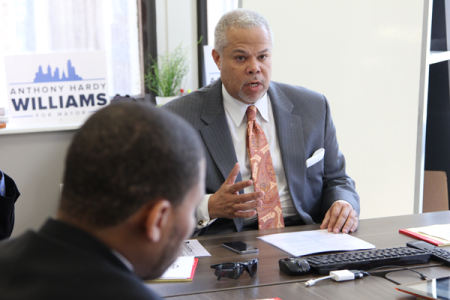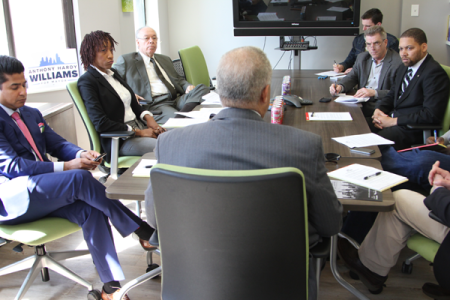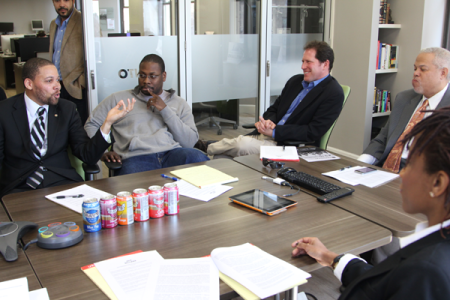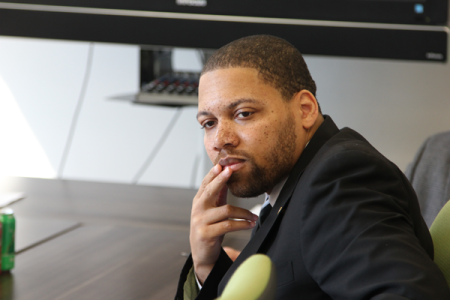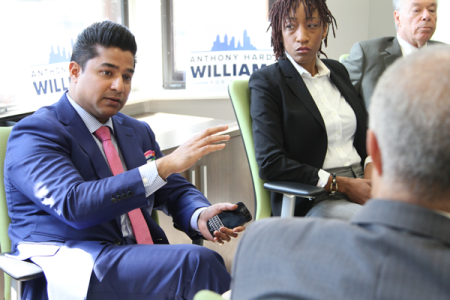Today I had the pleasure of joining a roundtable of economic development experts in support of State Senator Anthony Williams’ economic development plan: One Philadelphia Vision for a 21st Century Economy. I was joined by Ajay Raju, Brett Mandel, Joe Zuritsky, and Jon Gosier, all in support of Sen. Williams’ common sense but much needed vision on economic development in Philadelphia.
By far, this is the most comprehensive plan that I have seen from any of the 2015 crop of mayoral candidates. The next mayor will have to steer economic policy on a regional and global level, as well as a local community level. Not many economic policy approaches are as well rounded, but Sen. Williams’ proposal hits on all cylinders. The One Philadelphia Vision economic plan addresses our local economy on both the macro and micro level. It talks about nurturing the growth of both big businesses AND small businesses; instead of pitting big business vs. small business. In Philadelphia, we need both. And Sen. Williams’ economic policies make room for both.
Being an attorney and community nonprofit executive, it is important to me that every economic proposal addresses the needs of ordinary citizens living in our communities. Sen. Williams’ plan clearly makes the connection between bringing very high level businesses and tax policy to the city, while also connecting it to benefit ordinary people and how they access jobs.
Sen. Williams is the only candidate who has placed poverty front and center as a priority by laying out a two-generational approach to addressing it. Below are some of the highlights of Sen. Williams’ One Philadelphia Economic Plan:
- Reduce Philadelphia’s Poverty Rate: Support paid sick leave; increase minimum wage; build upon Shared Prosperity (Philadelphia’s poverty reduction plan); focus on two generation poverty reduction approach; expand Medicaid for 100,00 Philadelphians in poverty
- Fundamental Tax Reform: Reinstate wage and business income and receipts tax reductions; shift tax burden to commercial property tax base; continue improvements in delinquent tax collection
- Become a Business-Friendly City: Brand Philadelphia as “small business friendly” by
strengthening local preferences, eliminating red tape, improving licensing and permitting
processes, supporting immigrant-owned businesses, and conducting a comprehensive review of the Office of Economic Opportunity
- Grow New Industries: Leverage PGW and shale gas distribution to become an energy hub; support civic innovation and social entrepreneurship ecosystem and become the B-Corp capital of the U.S.; convene Philadelphia’s research universities and tech startup sector to attract private investment, and further develop Philadelphia’s video gaming sector
- Clean Streets, Thriving Neighborhoods: Implement citywide street sweeping for every neighborhood; review and continue 10 Year Property Tax Abatement program to increase
development in neighborhoods
- Closing the Skills Gap: Expand municipal youth workforce programs; improve alignment between community college and job training; partner with the business community to increase job opportunities for youth
- Tourism Promotion: Ensure Visit Philly-PHLCVB collaboration to attract diverse segments and promote Philadelphia neighborhoods beyond Center City
Those of you who are familiar with my work know that reducing Philadelphia’s 28% poverty rate is the foundation of my work. I am happy that Sen. Williams has adopted a two generation strategy and the Shared Prosperity plan as viable solutions to this big poverty issue that Philadelphia has. No economic plan would be complete without addressing poverty in Philadelphia.
As executive director of the Mayor’s Office of Community Services (MOCS), I laid the foundation for Mayor Nutter’s Shared Prosperity plan to address poverty in a new way. We talked about creating collective impact by bringing government, the private sector, the nonprofit sector, and the philanthropic sector together to create a common agenda around poverty. We also sought to organize and implement a coordinated approach to addressing these issues. I wrote another piece that elaborates on the two generation strategy that I currently implement at Diversified Community Services. When I see Sen. Williams talking about growing new industries, focusing on tax reform, while not forgetting that we have to close the skills gap and address poverty simultaneously; I see a leader who gets it.
I see a mayoral candidate who says that the path to Philadelphia’s progress does not have to be an either/or proposition. Is he for big business or small business? Well, he’s for both. Is he for center city or the neighborhoods? Again, he is for both. This is a plan that truly speaks to One Philadelphia. I like it. Sign me up!
Otis L. Bullock, Jr., Esq.

